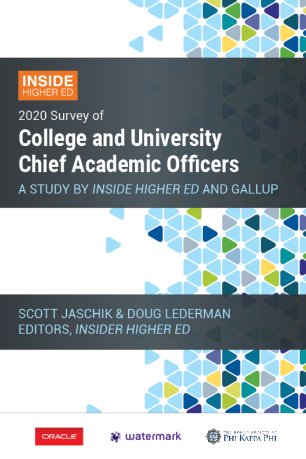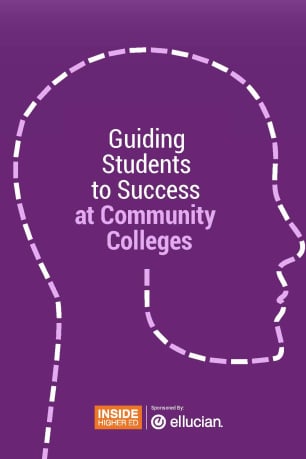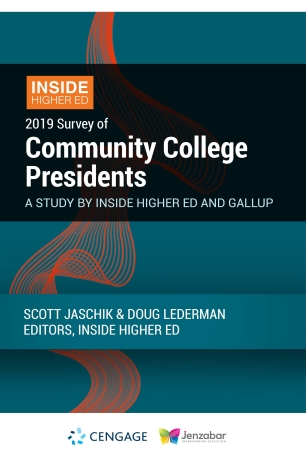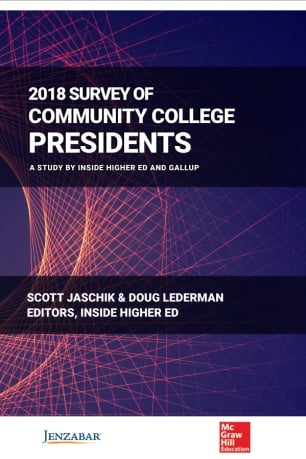Free Download
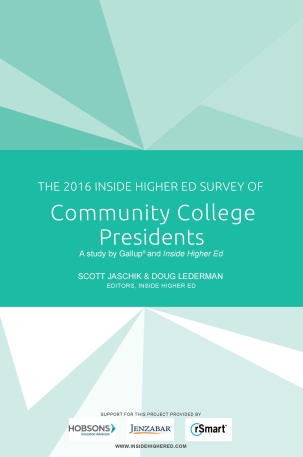
This time last year, the national conversation around the free community college movement seemed to be picking up steam.
On the heels of President Obama's America's College Promise, Oregon would join Tennessee as the second state to offer students a free two-year college education. And congressional Democrats would propose bills looking to turn the president's proposal into reality.
But community college presidents are divided about the likelihood of free two-year college happening any time soon. Inside Higher Ed's second annual Survey of Community College Presidents reveals that 37 percent disagree or strongly disagree that free community college programs will be adopted in at least one-third of states within the next five years; 35 percent agree or strongly agree that this will happen.
The survey, conducted by Gallup, features the impressions of 220 community college presidents on the current state of the free community college movement, their expectations of support from the next U.S. president and issues surrounding declining enrollments and graduation rates.
About the Survey
Inside Higher Ed's 2016 Survey of Community College Presidents was conducted in conjunction with Gallup. A copy of the report can be downloaded here.
Inside Higher Ed regularly surveys key higher ed professionals on a range of topics.
On Wednesday, May 4, Inside Higher Ed editors Scott Jaschik and Doug Lederman analyzed findings and answered readers' questions in a free webinar. To view the recorded webinar, please click here.
The Inside Higher Ed survey of community college presidents was made possible in part by advertising from Hobsons, Jenzabar and rSmart.
Several questions related to the politically popular idea of making community college education free -- and public higher education either free or debt-free.
The survey found that most community college presidents -- 62 percent -- support the idea of free community college. But they are deeply divided on the likelihood of it coming to pass.
When it comes to presidential campaigns and the discussions around free two-year college, 61 percent of community college presidents agreed or strongly agreed to supporting Democratic presidential candidates' proposals to make higher education free or debt-free. But 53 percent of presidents agreed or strongly agreed that political candidates' emphasis on four-year-college costs could shift attention away from the idea of free community college.
David Baime, senior vice president for government relations and policy analysis for the American Association of Community Colleges, said he was surprised by the number of presidents who felt as strongly as they did that the conversation around four-year institutions was causing a "political drag" for them.
"There's clearly tremendous work on Promise-type programs at the state and local levels, and I know the overwhelming majority of our member presidents are aware of that," he said. "But there has not been significant activity in Washington, outside of the proposal itself and introduction of two bills."
Baime said some people may associate the lack of activity with the nature of the national proposal and the timing of its introduction.
A plurality of two-year-college presidents -- 43 percent -- doubt that any future president will place as much emphasis on community colleges as President Obama has in the past, and most two-year college leaders -- 47 percent -- are neutral on whether or not the next president will place as much emphasis on the two-year sector.
"Until there are two nominees [one from each party], I don't know if the [community college] presidents, as a rule, will be tremendously focused on the particular higher education agendas of the candidates," Baime said. "Because there aren't nominees, the issues aren't crystallized for people. There haven't been any major proposals and nothing as sweeping from the remaining Republican candidates as the proposals Secretary Clinton and Senator Sanders have put on the table."
But Baime said it's important to remember that President George W. Bush, in his own way, was supportive of community colleges and proposed dedicated programs for the institutions. So too was President Clinton, who started a new focus on community colleges at the national level, he said.
Declining Enrollment
The survey also found that many community college presidents across the country are experiencing enrollment declines. Fifty-eight percent of presidents reported a decline compared to last year, with the most important factor behind the decline being decreases in unemployment, according to 79 percent of presidents.
But in Boston, Bunker Hill Community College President Pam Eddinger sees a different reason for her college's 2 percent decrease in students.
"Our limitation has been our ability to configure our schedule to fit the life demands of our nontraditional students," Eddinger said in an email.
Twelve percent of presidents attributed their enrollment declines to academic programs not aligning with student interests as the most important factor behind the decreases.
"If we had the flexibility and capacity in space during the times we needed it and when our working students demand it, we would likely be experiencing growth and no decline at all," Eddinger said, adding that Bunker Hill's campus was built to serve 8,000 students but is currently accommodating 14,000.
Graduation Rates
The survey also asked the presidents about an often controversial statistic -- graduation rates. Community colleges tend to have lower graduation rates. They often average lower than 30 percent for those who graduate within two to four years.
The presidents surveyed on average said a 41 percent graduation rate was a reasonable goal for community colleges nationwide. The presidents had a slightly higher goal for their own institutions. The majority chose a range of rates that averaged about 47 percent for their own institutions.
| 0-24% | 12% |
| 25-49% | 40 |
| 50-74% | 35 |
| 75-100% | 14 |
| Mean | 47.2 |
| Median | 45 |
"It's heartening to see they have concrete goals for institution success," said Josh Wyner, vice president and executive director of the College Excellence Program at the Aspen Institute. "This is an important shift. If colleges are going to achieve this, there can't be a hundred things they're doing for a small group of students. They have to have a substantial, institutionwide, systemic change."
The colleges that are increasing graduation rates are making those changes. They're either changing the value proposition to students, so students see success after school, or they're creating clear guided pathways, or testing and improving classroom pedagogy, Wyner said, adding that he's seen each of these occur among past winners of the Aspen Prize for Community College Excellence.




